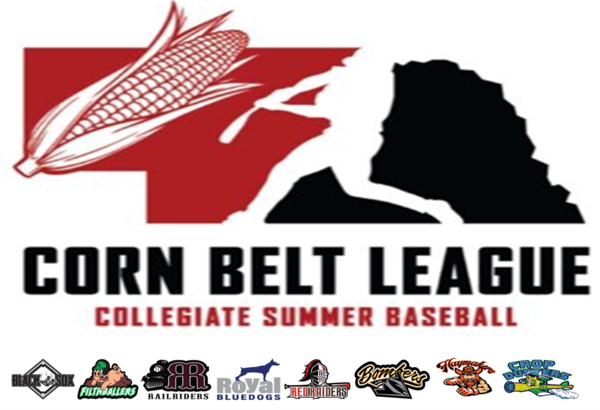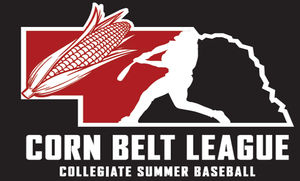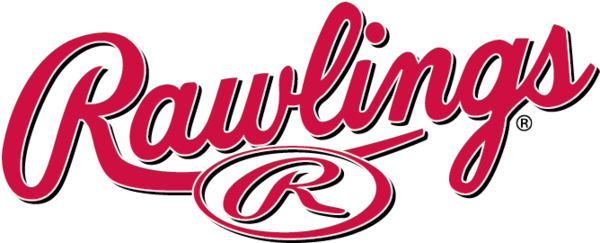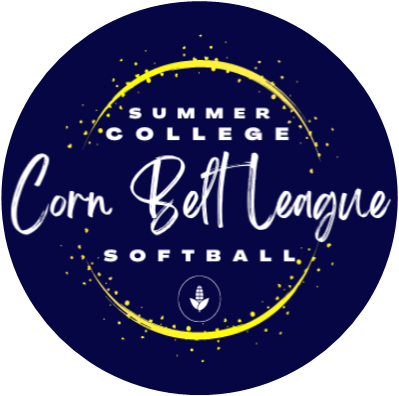
BASEBALL
"I LOVE COMING HERE TO PLAY": CORN BELT LEAGUE PROVIDES SUMMER BASEBALL FUN FOR PLAYERS AND FANS"
By Mike Patterson World-Herald staff writer
June 12, 2023

On a recent hot and humid night, you could hear the sounds that so many have missed this summer.
Infield chatter. The crack of a wood bat. Fans cheering.
Welcome to the Corn Belt League, where collegiate players are working hard to improve their future.
The league is in its seventh season under the watchful eye of Joe Siwa, owner of the Strike Zone athletic facility. It’s billed on the website as “the premier developmental college league in the Midwest.”
It’s tough to debate that point, and you certainly couldn’t do it with Siwa.
There have been forerunners to the Corn Belt—the Mink League and the Upper Deck League—but this one seems to have hit its stride. More than 180 players compete on eight teams and the games are spirited despite the steamy weather conditions.
Siwa said the biggest advantage to the league is that there is little travel. Most games are contested on the diamond at Seymour Smith Park, where UNO has played its home games in the past.
“We wanted to keep these players off the road,” Siwa said. “Local players can sleep in their own beds at night.”
Siwa added the league’s numbers continue to grow, another sign of the successful concept. More than 92 universities are represented by the players who are mostly collegiate freshman and sophomores.
“That’s the age group we’re aiming for,” Siwa said, “Once the players get older than that, they’re thinking about the draft and other things.”
Many are familiar names, who have moved on from the local varsity ranks. Other players, such as Idaho native Noah Ryan, have come from farther away.
Ryan, who hails from Boise, plays collegiately at Dakota Wesleyan in South Dakota. He competed in the Corn Belt League last year and has returned, playing for the “Filthballers”—a team whose logo is a pig wearing a batting helmet.
“I love coming here to play,” he said, “the community loves college baseball, and that’s something that kind of surprised me last year.”
The players also love the competition and play hard despite the hot, humid conditions. On a recent night, the temperature was a sultry 96 degrees for a late-afternoon game.
Ryan who works during the day and plays baseball at night, said the league gives the opportunity to hone his skills against similar competition.
“I could have played American Legion baseball last year but I knew that would mostly be against high school players,” he said. “This league has been just what I was looking for.” Two other players from Omaha—former Millard West teammates Tyler Bandiera and Easton Young—agree. Both have played at Barton Community College in Kansas and are now teammates with the Bombers of the Corn Belt League.
“This is my second year and I knew that I wanted to come back,” Bandiera said. “It’s fun to play with and against the guys you’ve come to know.”
Unfortunately for Bandiera, that second year was cut short. In the second at—bat of his first game, he was struck on the hand by a pitch and suffered a broken thumb. “I’m pretty much the base coach now, “ he said. “Not the summer I was hoping for.”
Young, a pitcher in his first year of Corn Belt play, was roughed up in a recent start. The opposing Black Sox struck five first-inning runs and went on to post a 7-5 win.
“In this heat, I felt like I was gassed after about 10 pitches.” he said. “But that will make me work even harder in my next start. Siwa said steps are in place to help guarantee the improvement of players who pay the $650 to play in the league. That fee included unlimited use of the Strike Zone hitting and pitching facilities.
“The college coaches talk to their players about what they need to work on,” Siwa said. “then we get that information and pass it along to our coaches.”
Those collegiate coaches also can monitor their players’ progress. Games are streamed live and the league website has updated statistics on each player.
The players also are in good hands, when they arrive. Siwa said there were more than 50 applications for the Corn Belt League’s head coaching positions. “We’ve brought in some really knowledgeable guys, “ he said. “We’re very comfortable with the staff we have in place.”
Siwa said he aims to create a s much parity to the league as possible, “We knew a lot of players already.” he said. “Most of our teams are around the .500 mark, and that’s what we like to see.”
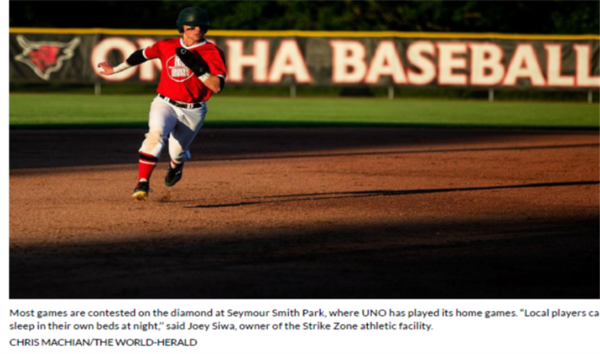
Though player improvement is the main goal. Siwa also works to make sure the experience is special. He cooked up 250 ears of corn for all eight teams one day.
Nate Schwanke, who played at Omaha Concordia and now competes for Central College in Iowa, said he was grateful to be part of the Corn Belt experience. “I’m really liking it,” he said.
The Red Raiders’ 10 AM Game also allowed the players to have a little extra fun.
“One of our guys had a grill in the dugout and was cooking up some eggs,” Schwanke said. “it was breakfast in the ball park.”
Siwa said it’s also important tha the league gives something back to the community. Through a related group called MVP4Life, the players have an opportunity to help mentor the kids in the community.
“We want to strengthen that bond between the league and the community as much as we can,” he said.
Siwa added that he hopes the league continues to grow, with his goal being eight teams. Several players already stay with host families and Siwa said more of those families will be needed in the future.
“I’d love to see 50 more out-of-state kids, which would mean 50 more host families, “ Siwa said. “we want to get the work out that playing here in Omaha is a positive experience. This year, we need almost 60 host families-so many out of town players came to Omaha to play."
In agreement is Susan Eberle, whose son Sam played varsity ball at Elkhorn Mount Michael. He now plays at Rockhurst University in Kansas City and for the Black Sox of the Corn Belt League. “He was too old to play legion ball so this was a great alternative.” she said. “He doesn’t have to travel, he likes his team and he’s having fun.”
Siwa said the league has found its niche, especially this year with the absence of the College World Series and the minor-league Storm Chasers. If players gain recognition and perhaps earn scholarships because of their Corn Belt participation, so much the better.
“People want to still watch baseball and we’re hear to give it to them,” he said. We’ve got a good thing going and we hope to make it even better.
